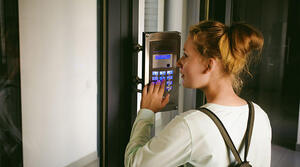Comparing Wired vs. Wireless Video Intercom Systems: Which is Right for You?
Corps
These systems offer a way to see and communicate with visitors before granting them access, enhancing security and peace of mind. However, when it comes to choosing the right Video Intercom System, one of the key decisions you'll face is whether to go for a wired or wireless system. Each option has its own set of advantages and drawbacks, and the best choice depends on your specific needs and circumstances. In this blog, we’ll compare wired and wireless video intercom systems to help you make an informed decision.
Understanding Video Intercom Systems
Video intercom systems are integrated security devices that allow you to communicate with visitors at your door through video and audio transmission. They can range from simple systems with a single indoor monitor and outdoor camera to more complex setups with multiple cameras, monitors, and advanced features like remote access via smartphone apps.
Wired Video Intercom Systems
Wired video intercom systems are traditional setups where each component is physically connected using cables. Here are some of the key advantages and disadvantages of wired systems:
Advantages of Wired Video Intercom Systems
- Reliable Connection: Since wired systems use physical cables to connect each component, they generally provide a more stable and reliable connection with less interference. This is particularly important in areas with a lot of wireless signal congestion.
- High-Quality Video and Audio: Wired systems often offer superior video and audio quality because they are less susceptible to the bandwidth limitations and signal degradation that can affect wireless systems.
- Security: Wired systems are inherently more secure as they are not exposed to the risks associated with wireless hacking or signal interception.
- Power Consistency: Wired systems are typically hardwired into your home’s electrical system, which means they are not reliant on batteries and won’t run out of power unexpectedly.
Disadvantages of Wired Video Intercom Systems
- Complex Installation: The installation process for wired systems can be complex and invasive, often requiring professional installation. This can involve drilling holes, running cables through walls, and connecting the system to your home’s electrical wiring.
- Cost: Due to the need for professional installation and the materials involved, wired systems can be more expensive upfront compared to their wireless counterparts.
- Lack of Flexibility: Once installed, wired systems are not easily moved or reconfigured. This can be a limitation if you decide to renovate your home or change the layout.
Wireless Video Intercom Systems
Wireless video intercom systems, on the other hand, use Wi-Fi or other wireless communication technologies to connect the components. Here are the main pros and cons of wireless systems:
Advantages of Wireless Video Intercom Systems
- Easy Installation: Wireless systems are much easier to install since they don’t require running cables through your home. Most wireless systems can be set up by the homeowner, saving on installation costs.
- Flexibility: Because there are no physical cables, wireless systems are more flexible and can be easily moved or expanded. This is ideal for renters or those who plan to move house.
- Modern Features: Wireless systems often come with modern features like smartphone integration, allowing you to see and speak with visitors remotely from your phone or tablet.
- Cost-Effective: While some high-end wireless systems can be pricey, many affordable options provide excellent functionality without breaking the bank.
Disadvantages of Wireless Video Intercom Systems
- Interference and Range Issues: Wireless systems can suffer from signal interference, particularly in areas with a lot of other wireless devices. The range can also be a limitation, especially in larger homes or buildings.
- Battery Dependence: Many wireless intercom systems rely on battery power, which means you need to monitor and replace batteries regularly to ensure the system remains operational.
- Security Concerns: Wireless systems can be vulnerable to hacking or signal interception. However, many modern systems incorporate encryption and other security measures to mitigate these risks.
Which is Right for You?
The choice between wired and wireless video intercom systems ultimately depends on your specific needs and circumstances. Here are a few considerations to help you decide:
- Installation and Budget: If you prefer a hassle-free installation and have a limited budget, a wireless system might be the best choice. However, if you don’t mind the higher upfront cost and complex installation process, a wired system can provide a more reliable and secure solution.
- Home Size and Layout: For larger homes or buildings, a wired system might be more suitable due to the potential range limitations and interference issues with wireless systems. Conversely, wireless systems are ideal for smaller homes or apartments where these issues are less of a concern.
- Flexibility and Future Proofing: If you value flexibility and the ability to easily expand or move your system, wireless is the way to go. Wired systems are less adaptable to changes, which can be a drawback if you plan to renovate or move.
- Security Needs: While both systems offer security benefits, wired systems provide a slight edge in terms of physical security due to their lack of exposure to wireless hacking.
Conclusion
Both wired and wireless video intercom systems have their own set of advantages and disadvantages. By considering factors such as installation complexity, budget, home size, flexibility, and security needs, you can make an informed decision about which type of system is right for you. Regardless of your choice, a video intercom system will undoubtedly enhance the security and convenience of your home or business, providing peace of mind and improved communication with visitors.














commentaires